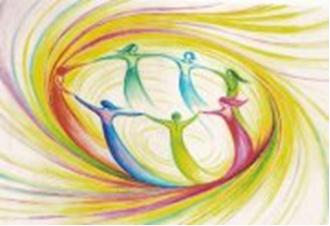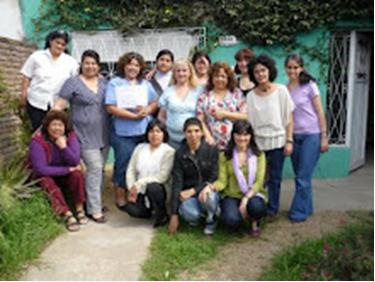|
(Nelly Borquez)
 In our first contacts with the people of the district where we are inserted, we felt very welcomed, especially by the women – by Alicia, Zulma, María, Nelly, Nazaré, Mary, Ida...We have had long conversations with them, exchanged addresses and telephone numbers. And we made plenty of time to share our life stories with one another. There were common points in each shared story such as the search for dignity and for their rights as women, the problems of our young people and the problem of drugs, the daily struggle to feed themselves and their families, concern for the education of their children, stories of violence that they have suffered personally, violence that has touched the lives of other women whom they accompanied, deaths of loved ones.... In our first contacts with the people of the district where we are inserted, we felt very welcomed, especially by the women – by Alicia, Zulma, María, Nelly, Nazaré, Mary, Ida...We have had long conversations with them, exchanged addresses and telephone numbers. And we made plenty of time to share our life stories with one another. There were common points in each shared story such as the search for dignity and for their rights as women, the problems of our young people and the problem of drugs, the daily struggle to feed themselves and their families, concern for the education of their children, stories of violence that they have suffered personally, violence that has touched the lives of other women whom they accompanied, deaths of loved ones....
In the Eucharist after listening to the Gospel (Mark 1, 40-45), we took time to share our thoughts on the text. We were surprised by the fact that some people linked the text with the discrimination experienced today, in their homes, in the district and even in Christian communities. People are discriminated against because of the colour of their skin, because they are different, because they think differently. We were all touched by what one of the women, Dona Duarte shared: “I was waiting in the pharmacy and behind me a Bolivian woman came in. She had two children with her and a baby in her arms. The owner of the pharmacy asked me if she could attend the Bolivian lady first. I thought that she was being considerate but when she said she wanted to serve her first because she wanted rid of her since she lowered the tone of the place and she could drive away other customers, I felt quite disillusioned”
This experience of sharing our faith with men and women of the wider community moved us and challenged us to be open, to listen to what God is saying to us through this reality. This reality teaches us to be flexible, to leave aside certain mental structures and prejudices and to bring all this to our personal and community prayer. We need to take time to be in silence before God, to silence our busy thoughts, concerns and allow God’s Spirit to lead us, put us in touch with our inner thirst, our deepest and most dynamic desires.
One of our desires is to learn to work as a Network, to promote life. This is why we got in touch with the “Women’s House” – a centre that operates in our area. Two of the women in the Centre, Nelly and Nazare welcomed us when we went.
Nelly Borquez is a 62 year old woman who co-ordinates a network of 14 centres where women who are victims of domestic violence come for help. She pioneered this work in La Matanza, Buenos Aires. At our first meeting she told us: “I am a militant, feminist Christian and I am very much in tune with liberation theology”.
She co-ordinates theological formation courses for lay people. She became involved with the issue of domestic violence in 1989 when she herself suffered violence at the hands of her partner: “It was at the time of high inflation and we organized popular kitchens in the localities. And from there with other women we began to gather together to talk about ourselves and our problems”
From 1993, she also began to work with “violent men” who had been sentenced by the courts for violence against women and children.
Nelly told us that one of the first tasks to carry out is to help women free themselves from cultural and religious messages that have been internalised since infancy.
After asking us what we would like, she invited us to collaborate in a Centre called “Women’s Wheel”. This is situated close to our house. She also offered us formation for ourselves since we all have to go through the process of liberating ourselves from destructive messages if we are to be in a position to be of help to others.
After saying goodbye to Nelly and Nazare, and as we walked home together we heard someone call out to us: “Wait! Are you the Sisters? Hello. My name is Ida. This is my house and it is open to you whenever you would like to visit and take tea, or water ...I have a lot to tell you”
 Our Corporate Commitment invites us to “Choose Life”, which demands a change of mentality so as to understand, feel and situate ourselves in a new way of relating to God, to humanity, to the earth and to all of creation” (CC) We participate in meetings that are called “Rooted for Life” where we explore a feminist holistic spirituality. These encounters help us progress in this change of mentality, enabling us to feel that we are part of a wider family. The meetings take place every two months and women from all over Buenos Aires participate – mothers of families, sisters of different religious congregations, women who have suffered violence....These meetings provide the space to reflect, share, seek together, encourage one another to change and grow. We look at and analyse our own stories from a woman’s perspective; we listen to one another, we share our experience of God using new and different language, we value our feminine intuition and our creativity to imagine and create a different future. Our Corporate Commitment invites us to “Choose Life”, which demands a change of mentality so as to understand, feel and situate ourselves in a new way of relating to God, to humanity, to the earth and to all of creation” (CC) We participate in meetings that are called “Rooted for Life” where we explore a feminist holistic spirituality. These encounters help us progress in this change of mentality, enabling us to feel that we are part of a wider family. The meetings take place every two months and women from all over Buenos Aires participate – mothers of families, sisters of different religious congregations, women who have suffered violence....These meetings provide the space to reflect, share, seek together, encourage one another to change and grow. We look at and analyse our own stories from a woman’s perspective; we listen to one another, we share our experience of God using new and different language, we value our feminine intuition and our creativity to imagine and create a different future.
We believe that “Love inhabits our personal stories and it is felt in the fragility of every beginning in life, where we can live a spirituality that takes root in the depths of our being and helps us live in freedom, creativity and fidelity to who we are and wish to be”
We feel very grateful for the present moment, for what we are living now, for so many good people that we meet on our journey and on whom we can depend...
Ana María Alvarez y Zulema Frank
Comunidad de Buenos Aires, Argentina
|


